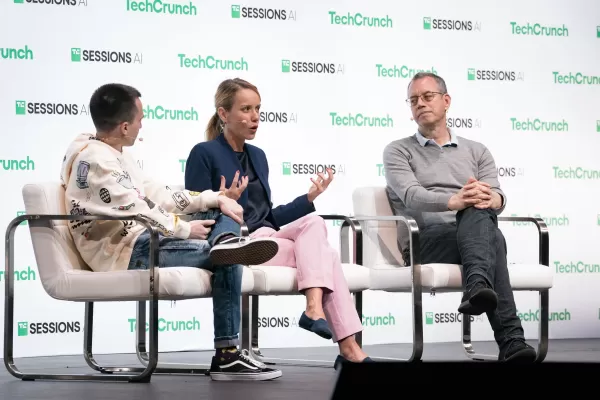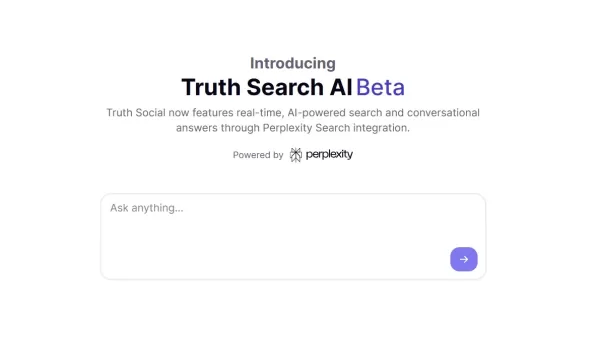Salesforce Unveils 5-Level AI Agent Framework, Dispelling Hype

Every time a press release about AI agents lands in my inbox, I can't help but feel a bit uneasy. It's not as bad as the dizziness I experience when someone tries to pitch me on "vibe coding," nor is it the cringe-worthy sensation I get from a PR rep using the word "convo" to ask for an interview. Yet, the hype around AI agents makes me skeptical. They're often overhyped, poorly defined, potentially risky, and their capabilities are quite limited. Some even suggest they could spell the end of life as we know it.
Despite my reservations, AI agents are all the rage. Microsoft recently made a series of announcements promoting their use of AI agents not just for businesses, but for every Windows user. Google followed suit this week, integrating AI agents into various applications, including coding tools. It's like letting the fox guard the henhouse, isn't it?
My biggest concern is that the promises made about AI agents often don't match their limitations, especially when it comes to how they interact across different ecosystems. It's a chaotic mix of AI promotion and innovation out there, but Salesforce brings a refreshing dose of sanity to the conversation.
Salesforce has introduced the Agentic Maturity Model, a framework that outlines key stages of AI agent adoption and capabilities. This model provides a common language to evaluate the flood of agent offerings from various vendors. Shibani Ahuja, SVP of Enterprise IT Strategy at Salesforce, emphasizes that while agents can be deployed quickly, scaling them effectively requires a thoughtful, phased approach. "Understanding the progression of AI agent capabilities is crucial for long-term success," she says, "and this framework offers a clear roadmap to help organizations achieve higher levels of AI maturity."
There's a significant gap between the public's perception of AI agents and what's actually possible. Vendors often label anything that follows a set of steps using AI as an "agent," which can lead to a lot of AI-washing. Even Apple's Siri, which has been around for a while, seems to be more hype than substance.
Salesforce's Five Levels of AI Agent Maturity
Salesforce breaks down the maturity of AI agents into five levels:
- Level 0: Fixed rules and repetitive tasks - These are basic automations with no AI learning involved. Think of customized email filters. While it might seem odd to include such basic tasks in a model about AI agents, it makes sense as a starting point. Imagine if these simple tasks could be enhanced with AI to become more intelligent. For instance, I've always wanted email rules that could sort press pitches into a folder but flag those directly relevant to my work. That's a job for a Level 2 agent.
- Level 1: Information retrieval agents - These agents pull in information and recommend actions based on it. A troubleshooting agent that searches for solutions or a shopping agent that compares prices are good examples. However, there's a catch. These agents are limited to the data within their ecosystem. For example, Microsoft Copilot won't be able to search your Google Docs or Notion database. So, Level 1 agents are effective within their host ecosystem.
- Level 2: Simple orchestration, single domain - This level addresses the ecosystem issue by focusing on a single data environment. Notion's AI, which derives knowledge from your Notion archive, is a great example. It can organize my articles based on specific criteria, but it can't integrate external data. This level is about low-complexity tasks within a single domain.
- Level 3: Complex orchestration, multiple domain - This is where AI agents start to fulfill their promise by orchestrating multiple workflows across different domains. It's challenging because it requires either cooperative APIs or screen reading/clicking methods. Social posting services illustrate the challenges; they can post to various platforms, but not all, and not to personal profiles on some networks. Level 3 can work if all domains cooperate, but there will always be limitations.
- Level 4: Multi-agent orchestration - This level involves any-to-any-agent operability across different systems with agent supervision. I once built a system like this with multiple AI agents working together to produce news articles. Each agent had a specific role, and they communicated seamlessly. However, achieving this level outside of enterprise settings seems unlikely due to the need for extensive control and integration.
The Agentic Maturity Model is a useful framework, but the name could be more engaging. Suggestions like the Agent Intelligence Scale or Agent Mastery Matrix might be more compelling. Regardless of the name, this system is a valuable tool for discussing AI agents and their capabilities.
What do you think about AI agents? Are they exciting, overhyped, or somewhere in between? Have you used any tools that fit into Salesforce's framework? What level do you believe most vendors are actually delivering, and how many are just AI-washing simple scripts? Do you think true multi-agent orchestration will be seen outside the enterprise anytime soon? Share your thoughts in the comments below.
Related article
 Dundundance: The Viral Dance Trend Taking Over Social Media
Have you discovered the internet's latest dance obsession that's equal parts hilarious and absolutely addictive? Meet Dundundance - the viral sensation that's not just about steps, but about unleashing pure joy through movement. This global phenomeno
Dundundance: The Viral Dance Trend Taking Over Social Media
Have you discovered the internet's latest dance obsession that's equal parts hilarious and absolutely addictive? Meet Dundundance - the viral sensation that's not just about steps, but about unleashing pure joy through movement. This global phenomeno
 "Exploring AI Safety & Ethics: Insights from Databricks and ElevenLabs Experts"
As generative AI becomes increasingly affordable and widespread, ethical considerations and security measures have taken center stage. ElevenLabs' AI Safety Lead Artemis Seaford and Databricks co-creator Ion Stoica participated in an insightful dia
"Exploring AI Safety & Ethics: Insights from Databricks and ElevenLabs Experts"
As generative AI becomes increasingly affordable and widespread, ethical considerations and security measures have taken center stage. ElevenLabs' AI Safety Lead Artemis Seaford and Databricks co-creator Ion Stoica participated in an insightful dia
 Truth Social’s New AI Search Engine Heavily Favors Fox News in Results
Trump's social media platform introduces an AI-powered search function with apparent conservative media slantExclusive AI Search Feature LaunchesTruth Social, the social media platform founded by Donald Trump, has rolled out its new artificial intell
Comments (7)
0/200
Truth Social’s New AI Search Engine Heavily Favors Fox News in Results
Trump's social media platform introduces an AI-powered search function with apparent conservative media slantExclusive AI Search Feature LaunchesTruth Social, the social media platform founded by Donald Trump, has rolled out its new artificial intell
Comments (7)
0/200
![ElijahCollins]() ElijahCollins
ElijahCollins
 August 14, 2025 at 5:00:59 AM EDT
August 14, 2025 at 5:00:59 AM EDT
This Salesforce AI framework sounds intriguing, but I'm skeptical about how much is real innovation versus marketing fluff. Anyone else worried about AI agents overpromising and underdelivering? 🤔


 0
0
![JuanAllen]() JuanAllen
JuanAllen
 July 22, 2025 at 2:33:07 AM EDT
July 22, 2025 at 2:33:07 AM EDT
The Salesforce AI agent framework sounds like a solid attempt to cut through the noise. I’m curious if it’ll actually deliver practical results or just add more buzzwords to the AI hype train. 🤔 Anyone else skeptical about these 'levels' making a real difference?


 0
0
![RaymondRoberts]() RaymondRoberts
RaymondRoberts
 May 29, 2025 at 7:41:18 AM EDT
May 29, 2025 at 7:41:18 AM EDT
Salesforce这次推出的5级AI代理框架感觉还挺靠谱的,不像某些公司老爱吹牛。虽然名字听起来有点复杂,但实际用起来确实让人觉得实用多了。


 0
0
![WillMitchell]() WillMitchell
WillMitchell
 May 29, 2025 at 12:19:55 AM EDT
May 29, 2025 at 12:19:55 AM EDT
El marco de agentes de IA de 5 niveles que Salesforce ha presentado parece bastante sólido. A diferencia de otros anuncios exagerados, este parece realmente útil y práctico.


 0
0
![VictoriaBaker]() VictoriaBaker
VictoriaBaker
 May 28, 2025 at 11:49:42 PM EDT
May 28, 2025 at 11:49:42 PM EDT
Le cadre d'agents d'IA à 5 niveaux dévoilé par Salesforce semble plutôt sérieux et ne fait pas dans l'exagération. C'est un bon point, même si le nom est un peu complexe.


 0
0
![RaymondGreen]() RaymondGreen
RaymondGreen
 May 28, 2025 at 7:45:42 PM EDT
May 28, 2025 at 7:45:42 PM EDT
Salesforceが発表した5レベルのAIエージェントフレームワークは、大げさな話題に比べてとても現実的だね。名前はちょっと難しそうだけど、実際に使える機能として評価できるよ。


 0
0

Every time a press release about AI agents lands in my inbox, I can't help but feel a bit uneasy. It's not as bad as the dizziness I experience when someone tries to pitch me on "vibe coding," nor is it the cringe-worthy sensation I get from a PR rep using the word "convo" to ask for an interview. Yet, the hype around AI agents makes me skeptical. They're often overhyped, poorly defined, potentially risky, and their capabilities are quite limited. Some even suggest they could spell the end of life as we know it.
Despite my reservations, AI agents are all the rage. Microsoft recently made a series of announcements promoting their use of AI agents not just for businesses, but for every Windows user. Google followed suit this week, integrating AI agents into various applications, including coding tools. It's like letting the fox guard the henhouse, isn't it?
My biggest concern is that the promises made about AI agents often don't match their limitations, especially when it comes to how they interact across different ecosystems. It's a chaotic mix of AI promotion and innovation out there, but Salesforce brings a refreshing dose of sanity to the conversation.
Salesforce has introduced the Agentic Maturity Model, a framework that outlines key stages of AI agent adoption and capabilities. This model provides a common language to evaluate the flood of agent offerings from various vendors. Shibani Ahuja, SVP of Enterprise IT Strategy at Salesforce, emphasizes that while agents can be deployed quickly, scaling them effectively requires a thoughtful, phased approach. "Understanding the progression of AI agent capabilities is crucial for long-term success," she says, "and this framework offers a clear roadmap to help organizations achieve higher levels of AI maturity."
There's a significant gap between the public's perception of AI agents and what's actually possible. Vendors often label anything that follows a set of steps using AI as an "agent," which can lead to a lot of AI-washing. Even Apple's Siri, which has been around for a while, seems to be more hype than substance.
Salesforce's Five Levels of AI Agent Maturity
Salesforce breaks down the maturity of AI agents into five levels:
- Level 0: Fixed rules and repetitive tasks - These are basic automations with no AI learning involved. Think of customized email filters. While it might seem odd to include such basic tasks in a model about AI agents, it makes sense as a starting point. Imagine if these simple tasks could be enhanced with AI to become more intelligent. For instance, I've always wanted email rules that could sort press pitches into a folder but flag those directly relevant to my work. That's a job for a Level 2 agent.
- Level 1: Information retrieval agents - These agents pull in information and recommend actions based on it. A troubleshooting agent that searches for solutions or a shopping agent that compares prices are good examples. However, there's a catch. These agents are limited to the data within their ecosystem. For example, Microsoft Copilot won't be able to search your Google Docs or Notion database. So, Level 1 agents are effective within their host ecosystem.
- Level 2: Simple orchestration, single domain - This level addresses the ecosystem issue by focusing on a single data environment. Notion's AI, which derives knowledge from your Notion archive, is a great example. It can organize my articles based on specific criteria, but it can't integrate external data. This level is about low-complexity tasks within a single domain.
- Level 3: Complex orchestration, multiple domain - This is where AI agents start to fulfill their promise by orchestrating multiple workflows across different domains. It's challenging because it requires either cooperative APIs or screen reading/clicking methods. Social posting services illustrate the challenges; they can post to various platforms, but not all, and not to personal profiles on some networks. Level 3 can work if all domains cooperate, but there will always be limitations.
- Level 4: Multi-agent orchestration - This level involves any-to-any-agent operability across different systems with agent supervision. I once built a system like this with multiple AI agents working together to produce news articles. Each agent had a specific role, and they communicated seamlessly. However, achieving this level outside of enterprise settings seems unlikely due to the need for extensive control and integration.
The Agentic Maturity Model is a useful framework, but the name could be more engaging. Suggestions like the Agent Intelligence Scale or Agent Mastery Matrix might be more compelling. Regardless of the name, this system is a valuable tool for discussing AI agents and their capabilities.
What do you think about AI agents? Are they exciting, overhyped, or somewhere in between? Have you used any tools that fit into Salesforce's framework? What level do you believe most vendors are actually delivering, and how many are just AI-washing simple scripts? Do you think true multi-agent orchestration will be seen outside the enterprise anytime soon? Share your thoughts in the comments below.
 Dundundance: The Viral Dance Trend Taking Over Social Media
Have you discovered the internet's latest dance obsession that's equal parts hilarious and absolutely addictive? Meet Dundundance - the viral sensation that's not just about steps, but about unleashing pure joy through movement. This global phenomeno
Dundundance: The Viral Dance Trend Taking Over Social Media
Have you discovered the internet's latest dance obsession that's equal parts hilarious and absolutely addictive? Meet Dundundance - the viral sensation that's not just about steps, but about unleashing pure joy through movement. This global phenomeno
 "Exploring AI Safety & Ethics: Insights from Databricks and ElevenLabs Experts"
As generative AI becomes increasingly affordable and widespread, ethical considerations and security measures have taken center stage. ElevenLabs' AI Safety Lead Artemis Seaford and Databricks co-creator Ion Stoica participated in an insightful dia
"Exploring AI Safety & Ethics: Insights from Databricks and ElevenLabs Experts"
As generative AI becomes increasingly affordable and widespread, ethical considerations and security measures have taken center stage. ElevenLabs' AI Safety Lead Artemis Seaford and Databricks co-creator Ion Stoica participated in an insightful dia
 Truth Social’s New AI Search Engine Heavily Favors Fox News in Results
Trump's social media platform introduces an AI-powered search function with apparent conservative media slantExclusive AI Search Feature LaunchesTruth Social, the social media platform founded by Donald Trump, has rolled out its new artificial intell
Truth Social’s New AI Search Engine Heavily Favors Fox News in Results
Trump's social media platform introduces an AI-powered search function with apparent conservative media slantExclusive AI Search Feature LaunchesTruth Social, the social media platform founded by Donald Trump, has rolled out its new artificial intell
 August 14, 2025 at 5:00:59 AM EDT
August 14, 2025 at 5:00:59 AM EDT
This Salesforce AI framework sounds intriguing, but I'm skeptical about how much is real innovation versus marketing fluff. Anyone else worried about AI agents overpromising and underdelivering? 🤔


 0
0
 July 22, 2025 at 2:33:07 AM EDT
July 22, 2025 at 2:33:07 AM EDT
The Salesforce AI agent framework sounds like a solid attempt to cut through the noise. I’m curious if it’ll actually deliver practical results or just add more buzzwords to the AI hype train. 🤔 Anyone else skeptical about these 'levels' making a real difference?


 0
0
 May 29, 2025 at 7:41:18 AM EDT
May 29, 2025 at 7:41:18 AM EDT
Salesforce这次推出的5级AI代理框架感觉还挺靠谱的,不像某些公司老爱吹牛。虽然名字听起来有点复杂,但实际用起来确实让人觉得实用多了。


 0
0
 May 29, 2025 at 12:19:55 AM EDT
May 29, 2025 at 12:19:55 AM EDT
El marco de agentes de IA de 5 niveles que Salesforce ha presentado parece bastante sólido. A diferencia de otros anuncios exagerados, este parece realmente útil y práctico.


 0
0
 May 28, 2025 at 11:49:42 PM EDT
May 28, 2025 at 11:49:42 PM EDT
Le cadre d'agents d'IA à 5 niveaux dévoilé par Salesforce semble plutôt sérieux et ne fait pas dans l'exagération. C'est un bon point, même si le nom est un peu complexe.


 0
0
 May 28, 2025 at 7:45:42 PM EDT
May 28, 2025 at 7:45:42 PM EDT
Salesforceが発表した5レベルのAIエージェントフレームワークは、大げさな話題に比べてとても現実的だね。名前はちょっと難しそうだけど、実際に使える機能として評価できるよ。


 0
0





























